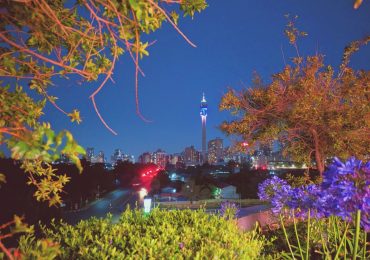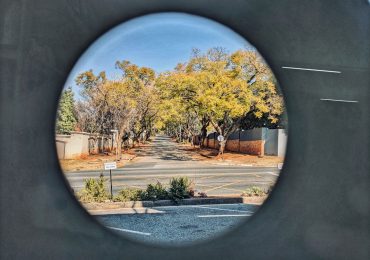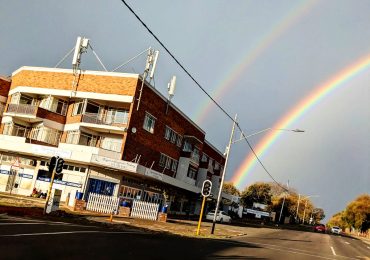Athambile Masola • Fungai Machirori • Wamuwi Mbao • Anna Stroud • Dimakatso Sedite • Margie Orford • Siphiwe Gloria Ndlovu • Nana Darkoa Sekyiamah • Lester Walbrugh • mpho ndaba • Roy Udeh-Ubaka • Ben Okri • Kopano Ratele • Bolu Babalola • Omolola Ijeoma Ogunyemi • Barbara Masekela • Matthew Wilhelm-Solomon • Joy Watson • Mohsin Hamid • Christopher McMichael • Ken Kweku Nimo • Pulane Mlilo Mpondo • Victor Dlamini • Tymon Smith • Jennifer Malec
Welcome to the fourth issue of Volume 6 of The Johannesburg Review of Books!
In this issue, Athambile Masola reviews Barbara Masekela’s Poli Poli, a memoir that exemplifies the paradox of the ordinary and the spectacle in black women’s life writing; Wamuwi Mbao considers The Blinded City by Matthew Wilhelm-Solomon, a lucidly fascinating immersion into the world of the people who occupy the ‘dark buildings’ of Johannesburg; and Fungai Machirori reviews Nana Darkoa Sekyiamah’s The Sex Lives of African Women, an important addition to writing that resists the fetishisation of Black women’s experiences.
The JRB Editor Jennifer Malec sits down with EAP member Margie Orford to talk about the challenges of writing about sexual violence, the politics of shame, and her new novel The Eye of the Beholder, while Christopher McMichael talks to mpho ndaba about violent policing, its historical origins, and his new book Shoot to Kill: Police and Power in South Africa. Elsewhere in the issue, Anna Stroud chats to Joy Watson about ‘nasty women’, how the markers of identity write themselves into our stories, and her debut novel, The Other Me.
In our poetry corner, we’re delighted to share three poems from Dimakatso Sedite’s collection Yellow Shade, winner of a NIHSS Award and recently shortlisted for the Ingrid Jonker Prize.
In our survey of new fiction, you can dip into The Quality of Mercy, the new novel from award-winning writer Siphiwe Gloria Ndlovu; ‘Until It Doesn’t’, Roy Udeh-Ubaka’s Gerald Kraak Prize-winning story, excerpted from the new anthology The Beautyful Ones Have Just Been Born; as well as an exclusive excerpt from Lester Walbrugh’s forthcoming debut novel, Elton Baatjies.
We also present extracts from Things My Mother Left Me, the debut novel by Pulane Mlilo Mpondo; The Last Gift of the Master Artists, the new novel from Ben Okri; Bolu Babalola’s debut novel Honey and Spice and The Last White Man by Mohsin Hamid.
Wits University Press celebrates its centenary this year with a number of new publications, and in this issue you can read ‘The Last Word: Benedict Vilakazi’, excerpted from Wits University at 100. We also present an excerpt focusing on Rhodes Must Fall, patriarchy and feminism from Kopano Ratele’s new book Why Men Hurt Women and Other Reflections on Love, Violence and Masculinity. And feast your eyes on the rich history and a rapidly evolving industry of African in Fashion in an excerpt from the new book by Ken Kweku Nimo.
From our Photo Editor Victor Dlamini this month, a portrait of Naledi Mashishi.
And while you’re reading, enjoy ‘Forty tracks, 174 minutes’, a playlist compiled by Tymon Smith.
Here’s the complete breakdown of Vol. 6, Issue 4, which you will also find on our issue archive page:
Reviews
- Every time a black woman writes their story they are resisting marginalisation—Athambile Masola reviews Barbara Masekela’s memoir Poli Poli
- Those who haunt inner city Johannesburg have their own ways of being—Wamuwi Mbao reviews The Blinded City by Matthew Wilhelm-Solomon
- ‘An important collective political work’—Fungai Machirori reviews The Sex Lives of African Women by Nana Darkoa Sekyiamah
Interviews
- ‘What happens when you have a crime committed against a person that never ever comes to an end?’—Margie Orford talks to Jennifer Malec about her new novel The Eye of the Beholder
- ‘I think that it is important for every woman to claim the “nasty” in her’—Anna Stroud interviews Joy Watson on her debut novel, The Other Me
- ‘Someone tried to break into my house while I was writing this book’—Christopher McMichael talks to mpho ndaba about his new book Shoot to Kill: Police and Power in South Africa
Poetry
Fiction excerpts
- ‘All an educated African man could be in the City of Kings was a boy’—Read an excerpt from Siphiwe Gloria Ndlovu’s new novel The Quality of Mercy
- ‘He looked like a bad decision. The best kind of bad decision’—Read an excerpt from Bolu Babalola’s debut novel Honey and Spice
- Read an excerpt from Ben Okri’s new novel The Last Gift of the Master Artists
- ‘Her name belonged to another world, even though her body lived in ours’—Read an excerpt from Pulane Mlilo Mpondo’s debut novel Things My Mother Left Me
- ‘A raincloud sucks all the blue from the sky’—Read an excerpt from Lester Walbrugh’s forthcoming debut novel, Elton Baatjies
- ‘People were continuing to change, white people becoming dark’—Read an excerpt from The Last White Man by Mohsin Hamid
New non-fiction
- RhodesMustFall, patriarchy and feminism—read an excerpt from Why Men Hurt Women and Other Reflections on Love, Violence and Masculinity
- ‘He was determined to cement the Zulu language as a mighty force’—Read ‘The Last Word: Benedict Vilakazi’, excerpted from Wits University at 100
- [The JRB exclusive] Read ‘Until It Doesn’t’, Roy Udeh-Ubaka’s ‘brave and deeply moving’ Gerald Kraak Prize-winning story
- A rich history and a rapidly evolving industry—View photographs from Africa in Fashion: Luxury, Craft and Textile Heritage by Ken Kweku Nimo
Photography
Music
Obituary
The JRB Daily
- ‘Powerful’ 2022 Booker Prize shortlist announced—including NoViolet Bulawayo for Glory
- 2022 Sunday Times Literary Awards shortlists announced
- Jacques Coetzee wins 2022 Ingrid Jonker Prize for debut poetry for ‘delicate, deeply felt’ collection An Illuminated Darkness
- ‘An incandescent story’—Kenyan writer Idza Luhumyo wins 2022 Caine Prize for African Writing






One thought on “The Johannesburg Review of Books Vol. 6, Issue 4 (September 2022)”